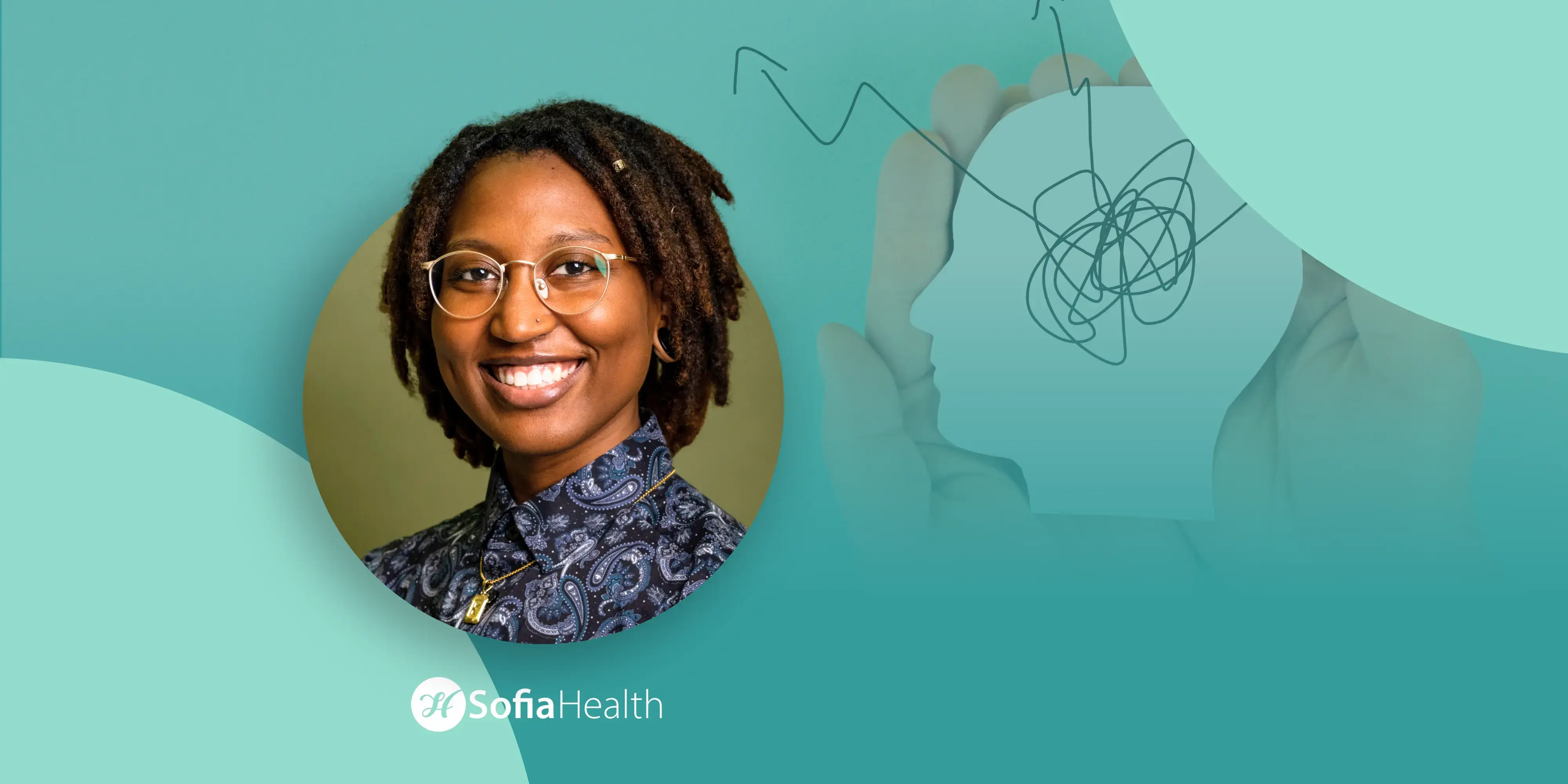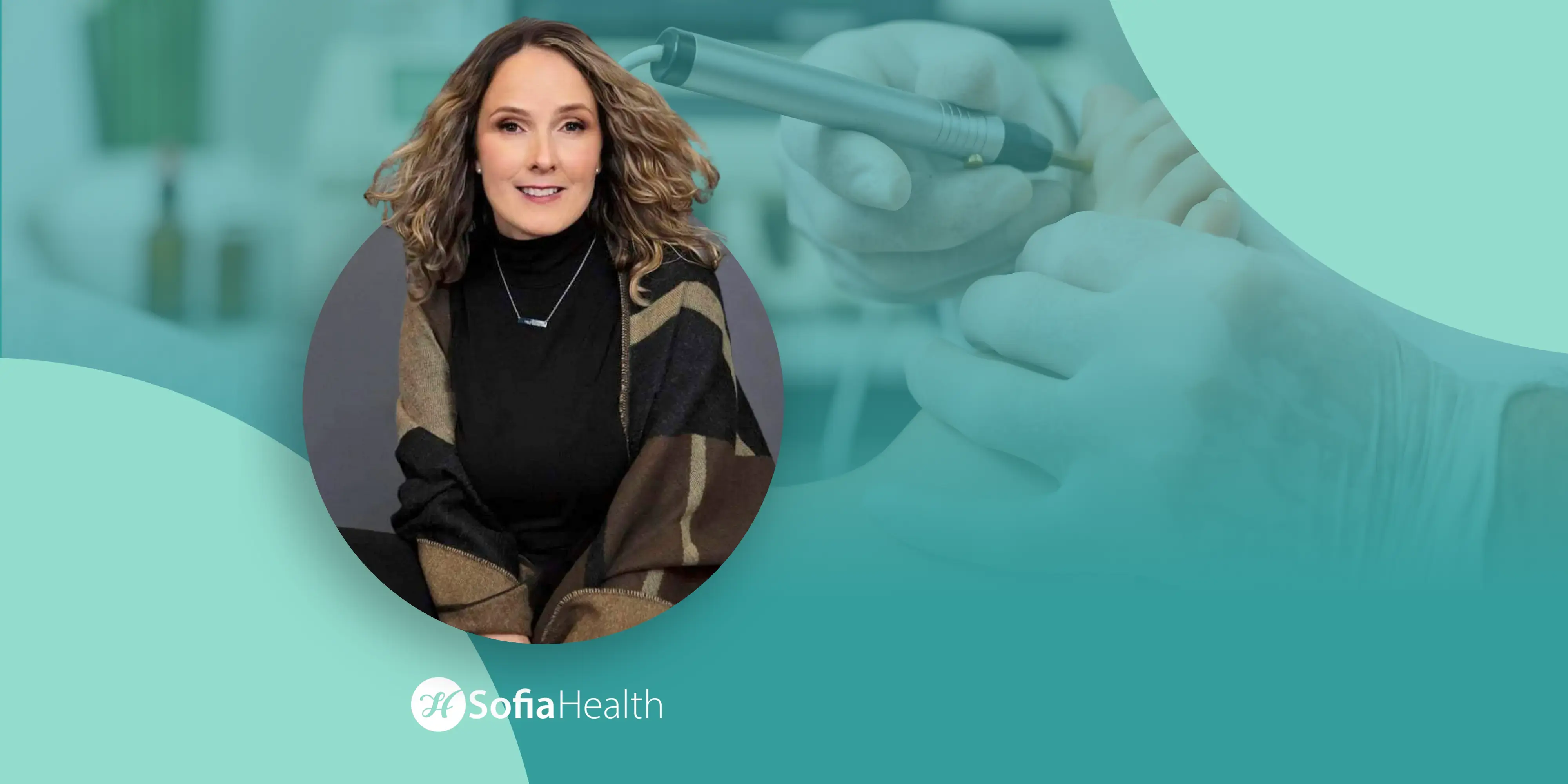Meet Jennifer Kreatsoulas, PhD, C-IAYT, a certified yoga therapist and author specializing in eating disorders. As the founder of Yoga for Eating Disorders, she offers virtual yoga therapy and resources to support recovery. Jennifer is passionate about integrating yoga into healing and educating others on its benefits. She authored Body Mindful Yoga and The Courageous Path to Healing, with her work featured widely in the media. Join us as she shares her expertise in this interview with Sofia Health.
How can yoga support someone recovering from an eating disorder?
Group yoga classes that are trauma-informed and in environments that foster self-compassion and self-awareness can be very helpful for individuals in eating disorder recovery. These classes can help us learn how to be present, pay attention to our bodies in kinder ways, and relearn how to listen to sensations.
Yoga therapy is an individualized modality that meets clients where they are on their recovery journey. The yoga therapist is part of the client’s outpatient team and can support the client through yoga practices like breathing, movement, and meditation. Some benefits include:
- Embodiment
- Emotional regulation
- Nervous system regulation
- Improve the relationship with your body
- Cultivate compassion and curiosity about your body
- Help manage depression and anxiety
- Cultivate self-reliance
- Increase self-worth
- Establish new beliefs grounded in health versus disordered eating
- Complement traditional forms of treatment and therapy
How does yoga therapy differ from traditional treatments like talk therapy? What benefits does it offer for holistic healing?
Yoga therapy is a holistic healing modality that restores physical, mental, emotional, and spiritual health. As a supplemental modality, yoga therapy offers a therapeutic space for those in recovery to develop new tools and coping strategies as they explore emotional and medical work with their outpatient team, which usually includes a therapist, dietician, and psychiatrist.
Yoga therapy includes the body in the healing experience, and this is key for eating disorder recovery. Breathing exercises can help calm anxiety, slow down spinning thinking, and cultivate presence and mental clarity. Yoga poses can lead to more comfort in and appreciation of the body with time, practice, and support. When done with a therapeutic intention (versus for fitness or a workout) can help clients relearn how to feel sensations and emotions again, and even hunger and fullness cues. This aspect is essential for recovery because the relationship with the body is severely disrupted when living with an eating disorder.
Grounding methods can help clients manage anxiety at meals and when encountering other recovery challenges. The core yogic philosophies, which include kindness, compassion, and acceptance, are extremely valuable for reframing food rules and additional self-destructive thoughts and behaviors. Bringing yoga therapy tools into day-to-day situations creates a sense of personal empowerment and hope in clients’ ability to manage symptom use, practice new perspectives about food and nourishment, and reframe negative body-image thoughts.
Yoga therapy is a great complement to talk therapy because it includes the body in healing the mind. For example, whereas a client may work with their therapist on the specific nuances and symptoms of their eating disorder experience, yoga therapy is the space to explore where certain feelings like fear live in the body and create practices of self-compassion to integrate into daily life.
Sofia Health connects you to traditional, integrative, nutritional, holistic, and spiritual healing professionals to help you personalize your healing journey.
As the founder of Yoga for Eating Disorders, what inspired you to create this platform, and how do you envision it supporting individuals on their healing journeys?
How do you customize yoga therapy sessions for clients with different eating disorders like anorexia, bulimia, or binge eating?
A guiding principle of yoga therapy is that all individuals are whole exactly as they are. Therefore, we do not look at someone as a diagnosis. The practices that I do for each client are based on what they are comfortable with on that given day and these practices can range from guided meditations to gentle movements in a chair or on the floor to breathwork. We might also explore how to apply a concept from yoga philosophy to their recovery. I draw on my training to determine which practices are appropriate for the client’s health and am mindful of offering trauma-informed practices and language that will not activate or trigger the client. For example, if a client is particularly anxious at our session, I will be mindful to offer breathing practices that downregulate the nervous system versus aggravate the anxiety.
How do body awareness and mindfulness practices in yoga therapy help individuals develop a healthier relationship with their bodies and food?
With support, time, and repetition, the mindfulness practices learned in yoga therapy offer clients new coping strategies and tools to navigate the daily challenges of recovery. These practices can help clients feel more empowered in their lives, knowing they have the agency to choose a strategy or tool outside of the eating disorder or other destructive and unsustainable ways of coping. With yoga therapy’s emphasis on awareness, compassion, and non-harming, these messages in combination with the practices can help individuals forge healthier relationships with their body and food. It’s important to recognize that recovery is not linear and that it takes time to work with these practices in combination with one’s care team.
Why is community support crucial in eating disorder recovery? How do you create a sense of belonging in your yoga therapy programs?
I believe in community as a force for healing and promise to provide welcoming support to people of every body size, age, sex, gender, race, ethnicity, and socioeconomic group. Here, you are not a diagnosis, but a valuable member of our community who deserves to be seen, heard, and validated. To help foster community I offer a free support call every Wednesday afternoon on Zoom. This is not a therapy call (as I am not a therapist), but rather a space for sharing the highs and lows and offering encouragement and validation. I also facilitate the Yoga for Eating Disorders Community Facebook Group, where I share yoga practices, guided meditations, monthly recovery themes, inspiration, and more. To also help individuals feel less alone, I have a blog that features recovery stories written by members of the community.
What are the common challenges people face when seeking help for eating disorders, and how do you address these challenges in your advocacy work?
Unfortunately, there are many challenges in seeking help for eating disorders. The stigma that exists around these illnesses and seeking psychological help can often be a barrier. Research has predominantly focused on white girls and women with anorexia. The exclusion of other ethnicities and races, as well as boys, men, and other types of eating disorders, is also a barrier because these groups are often not properly evaluated or even considered to be suffering.
Many medical clinicians do not understand eating disorders and cause much harm through their weight-centered language, gaslighting, and fat shaming, causing those who need help to believe they are not worthy of it. More work is needed to understand how eating disorders affect the LGBTQ+ and BIPOC communities and other groups.
Of course, the health system is a barrier, and for those with health care, insurance companies will often cut off treatment before patients are stable enough to be discharged. Receiving treatment and care is a privilege, and it should not be. Care should be readily available for all, especially given that eating disorders affect over 70 million people worldwide and are the second most fatal mental illness. Like so many of my colleagues in the eating disorder space, we work hard to raise awareness that eating disorders do not discriminate and all deserve care.
What advice do you find most beneficial for maintaining optimal health?
To answer this question, I look to yoga philosophy, which has taught me that to be healthy we must nourish all the layers of our being: physical, energetic, mind/emotion, intellect/wisdom, and spirit/bliss. If we are only paying attention to one or two layers of our being and ignoring the rest of ourselves, we will be out of balance. I try to remember all the layers of my being and give to those parts a little each day, as well as remove those things that negatively affect any of those parts. I share this with my clients, too, as a framework for balance and health.
More from Sofia Health
Explore more enlightening interviews with specialists at Sofia Health. Gain diverse insights, practical tips, and transformative advice on health and wellness topics. Whether it's nutrition, mental well-being, or holistic healing, these expert interviews provide valuable resources for your journey to holistic health. Please read on and help yourself with knowledge for a healthier life.
Whether you prefer a subscription over live classes or want to shop for individual services, classes, or products, we have you covered. We're here to help you meet your wellness goals for physical, mental, emotional, and spiritual health. You can also take advantage of the services offered by one of the providers at the Sofia Marketplace.
Better yet, make a daily dose of wellness part of your routine. Sofia Prime offers both live classes and an extensive on-demand video library. Choose from high-quality offerings in wellness, nutrition, fitness, and meditation.
Start your two-week trial today and discover the difference that dedication and expert help can make.
Disclaimer: The Sofia Unfiltered Blog by Sofia Health is for general informational and entertainment purposes only and does not constitute the practice of medicine, nursing, or other professional healthcare services, including the giving of medical advice. No doctor/patient relationship is formed. The use of information in this article or materials linked from this article is at the user’s own risk. The content of this article is not intended to be a substitute for professional medical advice, diagnosis, or treatment. Users should not disregard or delay in obtaining medical advice for any medical condition they may have. For any health concerns, users should seek the assistance of their healthcare professionals.






